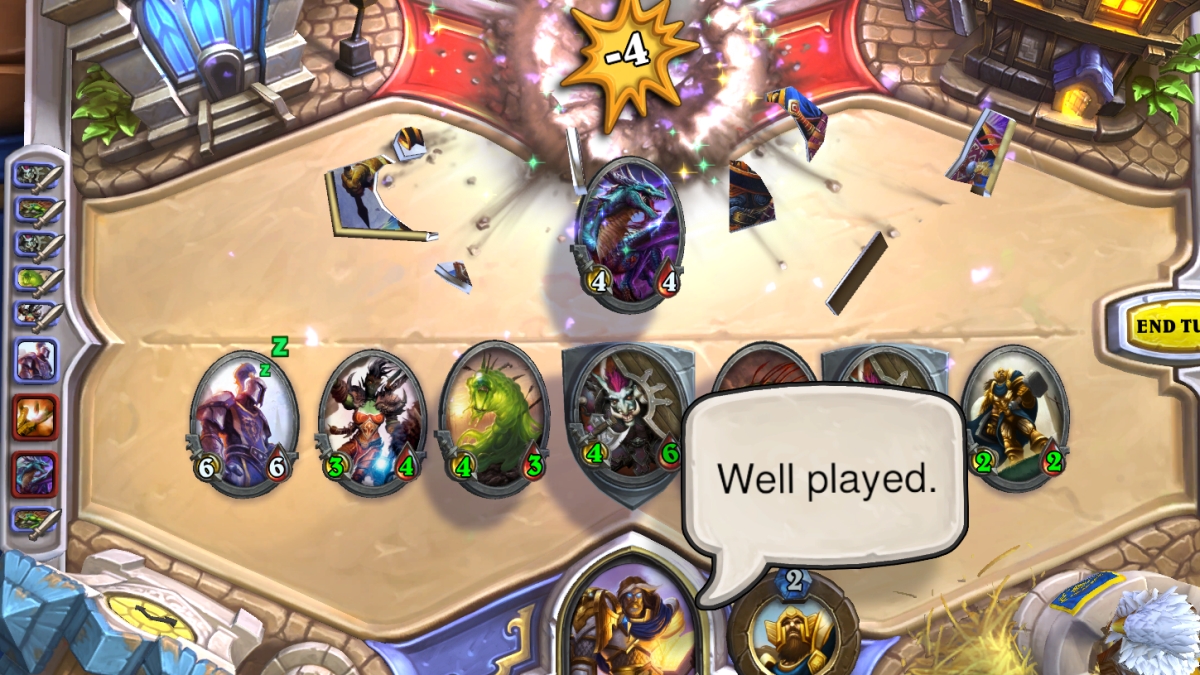Our Verdict
A fast, deep and exciting card game let down by its business model. Great when you're on a roll, rough when you're not.
PC Gamer's got your back
Hearthstone has changed significantly in the time since we published this review. Because of that, we've published a new review with up-to-date criticism. We've left this review here as a record of how we felt about Hearthstone when it first released in open beta.
What is it? A free-to-play competitive card game.
Expect to pay: Free-to-play
Developer: Blizzard Entertainment
Publisher: Blizzard Entertainment
Multiplayer: Online 1v1
Link: Official site
Buy: Download via Battle.net
"Lucky son of a bitch."
I'm playing against a mage. He has two hitpoints left, I have six. This is one of those games you look forward to - hard-fought, tense, down to the wire. I've got a taunt card in play, which means that my opponent's minions can't attack me directly. He needs to do direct damage with spell cards if he wants to end the game this turn. If he doesn't end the game this turn, I'll finish him.
As a mage, his class power allows him to do a single point of damage once per turn. He needs to be able to conjure up five points of damage from his hand, then, in order to finish me off. I know he doesn't have any Pyroblasts or Fireballs, because he's used them already.
He plays Frostbolt, dealing three points of damage. Then, he pauses. He shuffles some minions around, pecking at my taunt card. Hearthstone highlights the edges of cards that your opponent is mousing over. It's a nice touch. It gives the time between turns personality, and lets you know when your opponent isn't sure what to do.
He plays Arcane Missiles. It deals three points of damage split randomly between all of my cards. I've got two minions on the board in addition to my hero, so Arcane Missiles has a one-in-ten chance of hitting my hero twice - which is what the mage needs to happen to end the game. The fact that he's playing this card means he doesn't have anything more reliable; he's letting the match be decided on a dice roll.
One purple projectile smacks into a minion, the second hits me. Then the third one hits me, and I know the match is over. I've lost. I use the in-game voice wheel to say 'Well Played!', but I don't mean it. I say something altogether less polite in private. It's a sore loss, the kind that effectively purges my brain of all the dopamine released by the last time I won.
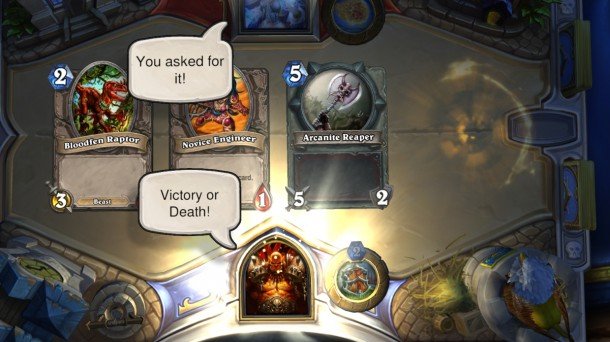
Hearthstone is an excellent strategy game, and I'd recommend it to anybody - but not without the preface that it will sometimes feel utterly unfair, that from time to time you'll feel that all its Blizzard polish is just a classy facade for a casino. If you're the type to get frustrated by games of chance, Hearthstone will find a variety of ways to get under your skin - and its treacherous random number generator is only one of them. I'll get to that in a minute. First, let's ride the game's topsy-turvy emotional rollercoaster all the way back up to the things it does so well.
Hearthstone is tuned for accessibility, stripping Magic: The Gathering back to its essentials. Decks are smaller, meaning you spend less time pondering over what cards to include. There's a single resource type - mana - and cards themselves break down into readily understandable types and paradigms. Matches are usually over within fifteen minutes, and Blizzard's renowned presentation means that every clash of cards looks and sounds great. It doesn't just mimic the physicality of real cards - Hearthstone enhances it, using sound and special effects to sell you on the power inherent in every hand you play. It's a card game with Quake's punch and Peggle's desire to make you feel great about yourself. Remember the first time you smacked an imp in Diablo II and it blew up in just the right way to make you want to do it again and again? That, but with cardboard wizards.
One of the things that impresses me about Hearthstone is the way each class represents the character of the hero they're based on. Warriors are relentless, aggressive, tough to kill. Mages hold you at arm's length until their powerful late-game spells come into play. Druids can be played fast and feral or slowly and manipulatively. Experience of WoW won't help you very much when it comes to learning Hearthstone, but the fact that it can give you a sense of where to start is a testament to Blizzard's skill at evoking personality through design.
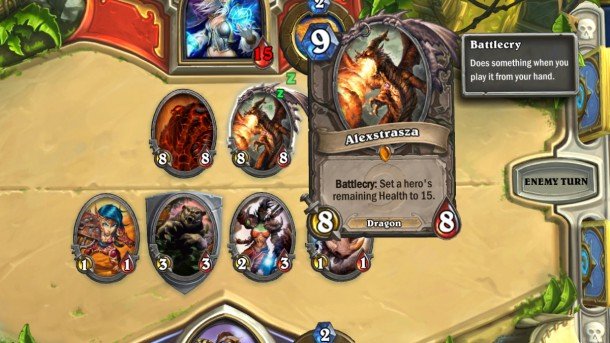
Matches have character, too. One could be a knife fight - lethal, immediate, over quickly. Another might feel like being a short kind on the receiving end of a playground drubbing, swinging pointlessly at the bully holding you at arm's reach. Then there are the drag-out matches that draw on every card you have, each play and movement inching you towards victory or defeat. Those are the best ones. The worst are the games that are spoiled by random chance beyond what a card game needs - the invisible dice rolls and ultra-rare legendary cards that sometimes show up to scupper your plans.
A clunky new player experience makes getting started more time-consuming than it should be. The tutorial does a basic job of explaining how to play cards, when to use hero abilities, and the fundamentals of deck construction. Then you're released into the actual game, able to play against bots or other people with the single class available to you at the start, the mage. You need to defeat the other classes in order to unlock them, and then every class begins at level one. Leveling up a class to level ten is necessary in order to unlock all of that deck's basic cards, which will take a couple of hours each depending on how well you play. If you're really committed to understanding how the game fits together, you then need to repeat that process for all nine classes.
I understand the need to structure the rate at which novice players encounter new mechanics, but for the player who wants to dive in and get started with the competitive game it feels like having your bungee cord spooled out to you a few feet at a time. Playing against AI will speed up your XP gain, but it won't teach you anything about challenging real people.
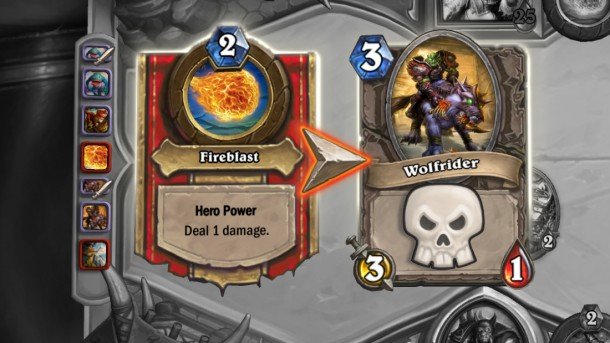
When you've done the grunt work necessary to start playing the game properly, Hearthstone comes into its own. It's at this point that a little homework is necessary, and it's a far more interesting part of the game's difficulty curve than the initial level grind. You'll learn how to balance a mana curve, draft combos, how to optimise every move you make to ensure that you're leading the game, not your opponent. After a while, losing starts to feel less arbitrary and the game becomes more of a contest. Then you'll progress beyond the point where your basic cards can win matches for you consistently, and you'll go on the hunt for the expert and legendary cards that you need to take your next big step forward.
Getting more cards means acquiring booster packs, which are available for real money, in-game gold, or through the Arena. Each contains a random selection of cards, and those same cards can be broken down into 'dust' which can be spent to create specific cards. If you're after the one legendary that'd be perfect for your competitive deck, you're either going to grind for it, get lucky, or spend real money to increase your chances.
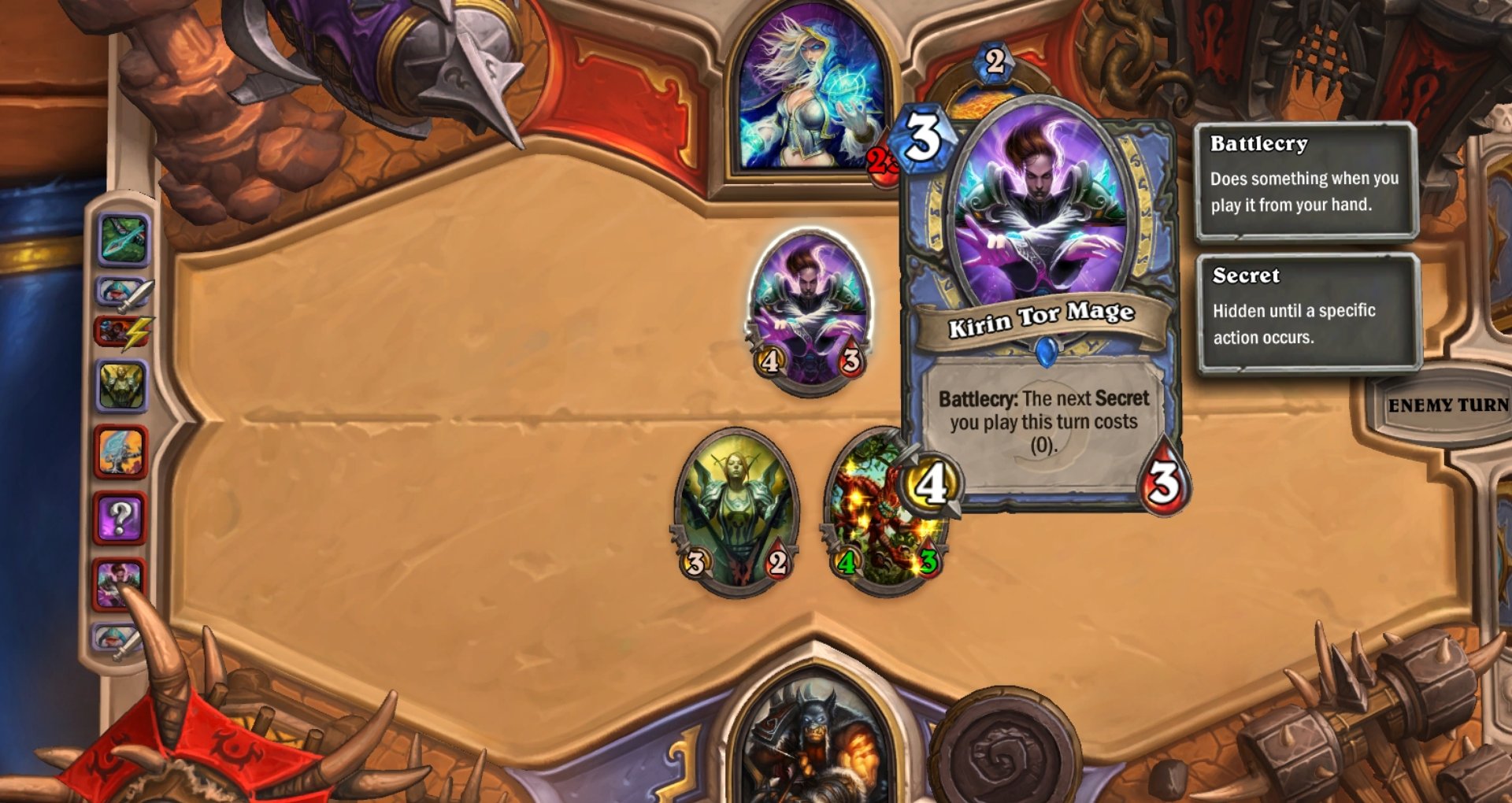
There are better business models. Hearthstone isn't pay-to-win - every card is available for free, technically - but paying does help , and more to the point when you spend you're always buying a chance at getting the card you want rather than the card itself. It feels like gambling, and that can sour the experience when you find yourself getting smacked down by someone else's ultra-rare card: one way or another, they got lucky.
The Arena is a premium mode that costs either real money or a sum of in-game gold to play. You can earn that gold by winning games and completing daily quests - 'win two games as a warrior', and so on. Dedicated players will earn an Arena run once per day, more or less. In the Arena you pick a class from a random selection of three and then assemble a thirty-card deck, one card at a time, in the same manner. It's detached from your regular card collection, which levels the playing field. It doesn't matter how much time or money you poured into getting those legendaries if they don't happen to show up in your random draft.
Once you've built your deck, you attempt to build a winning streak. Lose three times and you're out, but every win improves the quality of the rewards you'll get when you're eliminated. Gold, dust, and booster packs are guaranteed. It's more fun than grinding out boosters through regular play, but it's still a gamble.
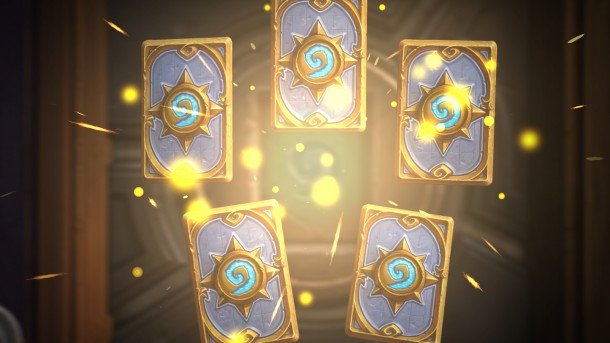
The most satisfying experience in Hearthstone is learning to control the chaos bubbling away under the hood. When you take somebody down with a commanding deck that you put together yourself - and pulled off perfectly - it feels great. The game provides that experience frequently enough to earn a recommendation, but it's let down by unnecessary degrees of randomisation elsewhere. If there was an option to drop a chunk of change to take away the card collection aspect entirely, I probably would; likewise, if I could trade with other players to build my decks on my own terms I'd do that too.
Blizzard have the power to make the game surrounding each individual match more rewarding: to level out the game's emotional arc and give players faster access to the tremendous competition that arises when two people, all else being equal, attempt to outdo one another. As it is, Hearthstone's competitive potential is hindered by the sense that you're never quite on a level playing field with your opponent - that a little money or time or luck could always tip the odds in your favour. Hearthstone goes from good to great, I think, by embracing the idea that luck isn't everything.
A fast, deep and exciting card game let down by its business model. Great when you're on a roll, rough when you're not.
Joining in 2011, Chris made his start with PC Gamer turning beautiful trees into magazines, first as a writer and later as deputy editor. Once PCG's reluctant MMO champion , his discovery of Dota 2 in 2012 led him to much darker, stranger places. In 2015, Chris became the editor of PC Gamer Pro, overseeing our online coverage of competitive gaming and esports. He left in 2017, and can be now found making games and recording the Crate & Crowbar podcast.
